Hundreds of Ethnicities, Hundreds of Values: Exploring Indonesia’s Indigenous Bioethics

The Center for Bioethics and Medical Humanities (CBMH), Faculty of Medicine, Public Health, and Nursing, Universitas Gadjah Mada (FK-KMK UGM), held its regular Raboan Research and Perspective Sharing Forum on Wednesday, June 25, 2025. This session featured a compelling and timely topic: “Ethno-Bioethics for Indonesia”, with Prof. Dr. Heddy Shri Ahimsa-Putra, M.A., M.Phil., Professor of Anthropology at UGM’s Faculty of Cultural Sciences, as the keynote speaker. The discussion was moderated by Mahmasoni Masdar, S.Kep., Ns., M.Kep. from CBMH FK-KMK UGM.
In his presentation, Prof. Heddy emphasized that the development of global bioethics is still largely influenced by Western paradigms, which prioritize principles such as autonomy, beneficence, non-maleficence, and justice. While these principles are important, they may not align directly with the diverse cultural values, social structures, and worldviews of the Indonesian people. He called on scholars and policymakers to consider more contextual and culturally grounded approaches to bioethics. To that end, he introduced the concept of “Ethno-Bioethics”, an approach rooted in local cultural values, indigenous knowledge systems (ethnoscience), and traditional ethical frameworks held by Indonesia’s many ethnic groups.
“Indonesia is not a single nation but a collection of hundreds of ethnic groups, each with their own ways of understanding life, health, birth, and death,” Prof. Heddy stated.
He explained that over 600 ethnic groups in Indonesia possess distinct ethical systems and traditional knowledge related to life and health. Unfortunately, much of this wisdom remains undocumented, passed down only through oral traditions, and has yet to be integrated into academic discourse or national health policy. As examples, he cited the Javanese principle of kerukunan (harmony) and the Balinese teachings on the welfare of all living beings, both of which reflect universal bioethical values.

Prof. Heddy highlighted the urgency of conducting ethnographic research across Indonesia to collect, document, and revitalize these local ethical frameworks. He proposed the formulation of a distinctive “Indonesian Bioethics” or even a “Pancasila Bioethics” as Indonesia’s unique contribution to the global bioethics dialogue. He also encouraged UGM—through CBMH—to become a national pioneer in bioethics education, documentation, and advocacy that is culturally inclusive, contextually relevant, and rooted in justice.
This Raboan discussion aligns closely with the Sustainable Development Goals (SDGs). It supports SDG 3 (Good Health and Well-Being) by promoting culturally appropriate and widely accepted ethical approaches in healthcare. It also advances SDG 10 (Reduced Inequalities) by amplifying the voices and ethical knowledge of marginalized ethnic communities often overlooked in national policies. Furthermore, the call for interdisciplinary collaboration and ethnographic research fosters partnerships in line with SDG 17 (Partnerships for the Goals).
In closing, Prof. Heddy called for the national academic community to seriously pursue ethnographic bioethics research across regions and cultures to shape an inclusive, pluralistic, and culturally just bioethics framework—one that truly reflects the soul of Indonesia.
Reporter: Ardhini Nugrahaeni, M.K.M.
Editor: Alvira Rahmasari, S.H.G.
[easy_youtube_gallery id=0SBn4cNGgew cols=1 ar=16_9 thumbnail=0 title=top]Etnobioetika: Bioetika untuk/di Indonesia[/easy_youtube_gallery]

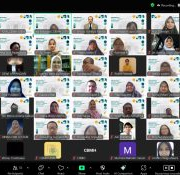
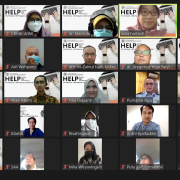
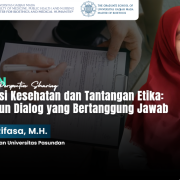
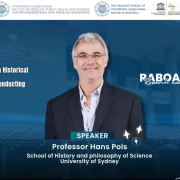
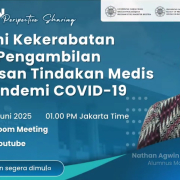


Leave a Reply
Want to join the discussion?Feel free to contribute!